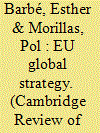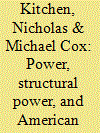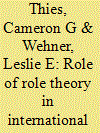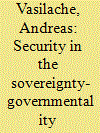|
|
|
Sort Order |
|
|
|
Items / Page
|
|
|
|
|
|
|
| Srl | Item |
| 1 |
ID:
170610


|
|
|
|
|
| Summary/Abstract |
Since the 1990s, US policy in Azerbaijan has gone through several important shifts in the areas of energy, security and democracy promotion. How can we make sense of these decisive shifts in the orientation of US policy? In this paper, I identify major shifts in US policy in Azerbaijan based on relative weight given to energy, security and democracy issues. I divide US policy into four different time periods: 1994 to 2001, 2001 to 2007, 2007 to 2015 and 2015 to present. I analyze the changes that took place in US policy in the dimensions of energy, security and democracy. Then, I provide plausible explanations that can account for shifts in US policy. To do so, I utilize foreign policy analysis theory that focuses on domestic and international parameters that bring major foreign policy shifts. My explanation is not monocausal, and focuses on several factors that have influenced US policy in Azerbaijan.
|
|
|
|
|
|
|
|
|
|
|
|
|
|
|
|
| 2 |
ID:
170609


|
|
|
|
|
| Summary/Abstract |
The European Union (EU) has been portrayed as a force for good in the international system. However, due to systemic changes in the international environment and the crises of European integration, its role in the world is becoming more contentious. This paper applies the politicization literature to EU foreign policy and, using the case of the EU Global Strategy (EUGS), questions the effects of emerging politicization for EU political integration. The paper analyses how the EUGS has downscaled the transformative ambition of EU foreign policy, showcasing an adverse framing of its strategic narrative. However, it also argues that this narrative has been accompanied by more integrationist practices, as shown by the institutional developments during the making of the EUGS and its implementation in security and defence. The paper concludes that the effects of emerging politicization in EU foreign policy can simultaneously reflect a less transformative narrative but lead to more integrated practices and policies.
|
|
|
|
|
|
|
|
|
|
|
|
|
|
|
|
| 3 |
ID:
170608


|
|
|
|
|
| Summary/Abstract |
Over the past twenty years, debates surrounding American power have oscillated between celebrations of empire and laments of decline. What explains such wild fluctuations? This article argues that the power shifts debate rests on an underpinning concept of power based around relative capabilities that is theoretically not fit for purpose. We propose instead an approach to power shifts that locates power primarily in structural power. In doing so we show that developments in the character of the international system render structural advantage more significant to questions of international leadership than the balance of national capabilities. These developments also mitigate against systemic changes that might bring relative strength and structural position into greater alignment.
|
|
|
|
|
|
|
|
|
|
|
|
|
|
|
|
| 4 |
ID:
170607


|
|
|
|
|
| Summary/Abstract |
This article demonstrates the benefits of using a role theory approach in the field of international political economy (IPE) by demonstrating its benefits relative to variants of the social constructivist paradigm, especially vis-à-vis identity-based accounts of IPE. This article also documents how role theory always had a home in IPE even before the constructivist revolution in the 1990s. The social interactionist dimension in the work of Herbert Mead and his notion of a general other are linked to the relational ideas of friendship and impartial spectator present in the works of the founding father of classical political economy, Adam Smith. These similar ideas about the self and their surrounding social environment are a useful starting point to locate role theory in IPE and demonstrate its analytical advantages within social constructivism. After showing the ‘forgotten’ place role theory has always had in IPE, the article illustrates the potential of using a role theory approach within the field of IPE through an illustrative analysis of the Greek economic crisis.
|
|
|
|
|
|
|
|
|
|
|
|
|
|
|
|
| 5 |
ID:
170606


|
|
|
|
|
| Summary/Abstract |
There is broad interest in both analytics and politics of governmentality in international security studies. Going beyond sovereignty-focussed perspectives, governmentality approaches contribute to a better understanding of security rationalities, strategies, and practices as well as provide important new insights into trans-border security issues. However, because the rejection of traditional, sovereign understandings of security is a constitutive trait of governmentality, governmentality-focussed approaches in general ignore the security logics and practices in non-liberal settings as well as the persistence of sovereign security patterns besides and within governmental security rationalities. Such blind spots are even more problematic in light of universalist analytical tendencies in governmentality IR. This paper aims at highlighting these blind spots of governmental security studies and argues for a more inclusive perspective that takes into account the ongoing relevance of sovereign security logics and practices. As a result, I suggest a linear conceptual model of a sovereignty-governmentality continuum that is able to grasp the complex and adjustable configurations of sovereign and governmental politics in empirical research, while sovereign and governmental patterns still remain distinguishable.
|
|
|
|
|
|
|
|
|
|
|
|
|
|
|
|
|
|
|
|
|